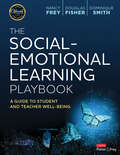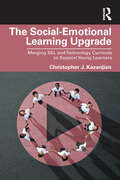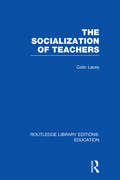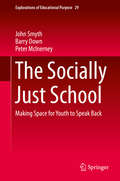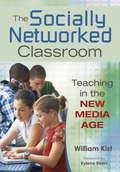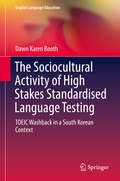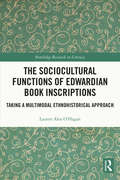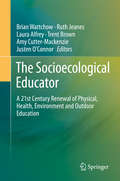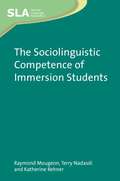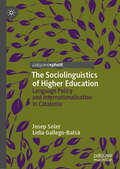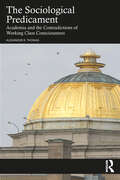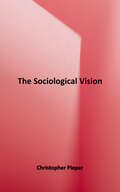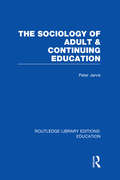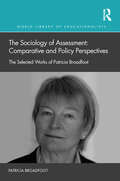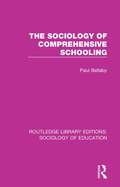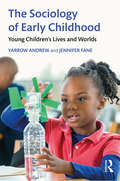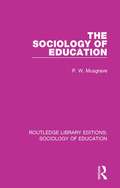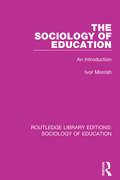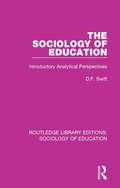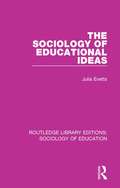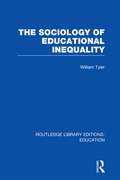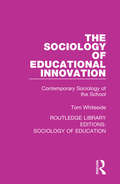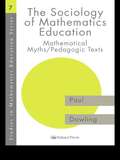- Table View
- List View
The Social-Emotional Learning Playbook: A Guide to Student and Teacher Well-Being
by Douglas Fisher Nancy Frey Dominique SmithTeach skills and foster the dispositions of social and emotional learning in yourself, your students, and your school. Social and emotional learning (SEL) is like any academic subject students learn in school—their learning expands and deepens, year after year. As an educator, what can you do to support not only your students’ well-being and SEL development, but your own? The Social-Emotional Learning Playbook: A Guide to Student and Teacher Well-Being provides the language, moves, and evidence-based advice you need to identify and nurture social and emotional learning in yourself, your students, and your school. Sparking deep reflection and transformative growth, this highly interactive playbook profiles six tenets of social and emotional learning—building resilience, belonging and prosocial skills, emotional regulation, relational trust and communication, individual and collective efficacy, and community of care. Each module features Reflection prompts and self-awareness resources that help teachers identify strengths, target areas for growth, and engage with colleagues over social and emotional development. Strategies for teaching and reinforcing SEL skills that are proven through effect size to increase your impact on students, both academically and socially. Ideas for creating a school culture that manifests social and emotional learning in policies, procedures, and interactions with families and the community. Vocabulary self-assessments, word clouds, and a "Case in point" feature that allows you to analyze a situation, cognitively reframe it, and decide a course of action. With this actionable playbook in hand, jumpstart your social and emotional development journey, reduce compassion fatigue, and create alliances and opportunities for the children and adults in your school community to thrive.
The Social-Emotional Learning Playbook: A Guide to Student and Teacher Well-Being
by Douglas Fisher Nancy Frey Dominique SmithTeach skills and foster the dispositions of social and emotional learning in yourself, your students, and your school. Social and emotional learning (SEL) is like any academic subject students learn in school—their learning expands and deepens, year after year. As an educator, what can you do to support not only your students’ well-being and SEL development, but your own? The Social-Emotional Learning Playbook: A Guide to Student and Teacher Well-Being provides the language, moves, and evidence-based advice you need to identify and nurture social and emotional learning in yourself, your students, and your school. Sparking deep reflection and transformative growth, this highly interactive playbook profiles six tenets of social and emotional learning—building resilience, belonging and prosocial skills, emotional regulation, relational trust and communication, individual and collective efficacy, and community of care. Each module features Reflection prompts and self-awareness resources that help teachers identify strengths, target areas for growth, and engage with colleagues over social and emotional development. Strategies for teaching and reinforcing SEL skills that are proven through effect size to increase your impact on students, both academically and socially. Ideas for creating a school culture that manifests social and emotional learning in policies, procedures, and interactions with families and the community. Vocabulary self-assessments, word clouds, and a "Case in point" feature that allows you to analyze a situation, cognitively reframe it, and decide a course of action. With this actionable playbook in hand, jumpstart your social and emotional development journey, reduce compassion fatigue, and create alliances and opportunities for the children and adults in your school community to thrive.
The Social-Emotional Learning Upgrade: Merging SEL and Technology Curricula to Support Young Learners
by Christopher J. KazanjianThe Social-Emotional Learning Upgrade explores how today’s educators can connect two previously separated but important curricula in their schools: social-emotional learning (SEL) and educational technology. With schools’ SEL efforts pressed for time and resources and digital engagements often limited to skill development, K-12 students risk being unprepared to sustain their well-being and personal opportunities in a rapidly changing, technology-dependent world. Driven by a paradigm that synthesizes multicultural education and humanistic psychology, this book readies educators to implement SEL curricula that will support young learners as they navigate constant social and technological flux and that will nurture their unique perceptions of reality, their aspirations, and their mental and physical health. Each chapter’s novel insights will help to mitigate both student disengagement and teacher demoralization, enabling classroom pedagogies and the process of schooling to better align with the ways in which learners explore, express, and create meaning. Guiding pre-service teachers, leaders, and curriculum developers beyond common goals such as digital skills development, content mastery, or standardized testing, this volume focuses instead on complex digital literacies, collaborative experiences, problem- and project-based learning, culturally relevant pedagogies, and overall holistic growth.
The Socialization of Teachers (Routledge Library Editions: Education)
by Colin LaceyThe change from a student role to a teacher role can be one of the most abrupt and stressful transitions in working life but the process of socialization does not end when the student becomes a fully qualified teacher, as many writers, laymen and sociologists, would have us believe. Colin Lacey argues that socialization is a partial and rarely homogenous process. He illustrates this from a wide variety of interesting case material to show how student teachers adapt their responses to the classroom situation.
The Socially Just School
by John Smyth Barry Down Peter McinerneyThis book explores schools and how they can function as social institutions that advance the interests and life chances of all young people, especially those who are already the most marginalized and at an educational disadvantage. Social justice is a key theme as the book examines the needs of youth, the concept of school culture, school/community relations, socially critical pedagogy, curriculum and leadership and a socially critical approach to work. The Socially Just School is based upon four decades of intensive writing and researching of young lives. This work presents an alternative to the damaging school reform in which schools are made to serve the interests of the economy, education systems, the military, corporate or national interests. Readers will discover the hallmarks of socially just schools: - They educationally engage young people regardless of class, race, family or neighbourhood location and they engage them around their own educational aspirations. - They regard all young people as being morally entitled to a rewarding and satisfying experience of school, not only those whose backgrounds happen to fit with the values of schools. - They treat young people as having strengths and being 'at promise' rather than being 'at risk' and with 'deficits' or as 'bundles of pathologies' to be remedied or 'fixed'. - They are 'active listeners' to the lives and cultures of their students and communities and they construct learning experiences that are embedded in young lives. This highly readable book will appeal to students and scholars in education and sociology, as well as to teachers and school administrators with an interest in social justice.
The Socially Networked Classroom: Teaching in the New Media Age
by William R. KistIncorporate social networking into instruction, no matter your level of technological expertise or Internet access! With appropriate guidance, students’ social networking skills can be harnessed for teaching and learning in the 21st century. William Kist demonstrates how pioneering teachers have successfully integrated screen-based literacies into instruction and provides: Real-world activities and lesson examples for Grades 5–12, with assignment sheets, assessments, and rubrics Ideas on fostering collaborative learning using blogs, wikis, nings, and other interactive media. Tips on Internet safety, blogging etiquette, protected blogging sites, and more Blog entries from classroom teachers
The Sociocultural Activity of High Stakes Standardised Language Testing: Toeic Washback In A South Korean Context (English Language Education #12)
by Dawn Karen BoothThis book explores the influence of high stakes standardised testing within the context of South Korea. South Korea is regarded as a shining example of success in educational achievement and, as this book reveals, pressurised standardised testing has been a major contributing factor to its success. This unique country provides an excellent setting from which to explore the powerful relationship that exists between testing and learning and can advance our understanding of which factors and test conditions will positively and negatively influence learning. This book follows the test activity of a group of Korean university students preparing for the TOEIC (Test of English for International Communication) and posits a revised model of the influence of testing on learning. It calls for a more socially situated view of tests and test-takers considered in relation to the sociocultural, historical, political and economic contexts in which they are embedded.
The Sociocultural Functions of Edwardian Book Inscriptions: Taking a Multimodal Ethnohistorical Approach (Routledge Research in Literacy)
by Lauren Alex O'HaganThis innovative text draws on theories and methodologies from the fields of multimodality, ethnography, and literacy studies to explore the sociocultural significance of book ownership and book inscriptions in Edwardian Britain. The Sociocultural Functions of Edwardian Book Inscriptions examines evidence gathered from historical records, archival documents, and the inscriptive practices of individuals from the Edwardian era to foreground the social, communicative, and performative functions of inscriptive practices and illustrate how material, lexical, and semiotic means were used to perform identity, contest social status, and forge relationships with others. The text adopts a unique ethnohistorical approach to multimodality, supporting the development of a typography of book inscriptions which will serve as a unique interpretive framework for analysis of literary artefacts in the context of broader sociopolitical forces. This text will benefit doctoral students, researchers, and academics in the fields of Literacy Studies, English language arts, and research methods in education more broadly. Those interested in British book history, anthropology, and 20th-century literature will also enjoy this volume.
The Socioecological Educator: A 21st Century Renewal of Physical, Health,Environment and Outdoor Education
by Amy Cutter-Mackenzie Justen O'Connor Ruth Jeanes Trent Brown Laura Alfrey Brian WattchowThis volume offers an alternative vision for education and has been written for those who are passionate about teaching and learning, in schools, universities and in the community, and providing people with the values, knowledge and skills needed to face complex social and environmental challenges. Working across boundaries the socio-ecological educator is a visionary who strives to build community connections and strengthen relationships with the natural world. The ideas and real-world case studies presented in this book will bring that vision a step closer to reality.
The Sociolinguistic Competence of Immersion Students
by Terry Nadasdi Raymond MougeonThis book reports the findings of an extensive research project on the acquisition of the native norms of spoken French variation by French immersion students who have learnt their second language primarily in an educational context. The project focused on a range of phonetic, lexical and grammatical sociolinguistic variants documented in studies of contemporary first language varieties of spoken French, and assessed the extent to which the students master the linguistic and extra-linguistic factors which govern variant choice. The book also discusses pedagogical strategies to improve the students' mastery of spoken French variation. The book represents an important contribution to an under-researched aspect of advanced Second Language Acquisition in an institutional setting.
The Sociolinguistics of Higher Education: Language Policy and Internationalisation in Catalonia
by Josep Soler Lídia Gallego-BalsàThis book investigates the sociolinguistic dimension of the internationalisation of higher education, examining the linguistic tensions and ambiguities experienced by universities around the world, particularly in non-anglophone contexts. Joining current debates within discursive and ethnographic approaches to language policy, the authors analyse the narrative emerging from university language policy documents, and then trace the stance-taking processes of different stakeholders at a small university in Catalonia. They pay particular attention to how teachers, administrative staff, and exchange students position themselves in connection to the role of Catalan and its coexistence with other languages at the university. This book will be of interest to language policy scholars and practitioners, as well as graduate students in sociolinguistics and applied linguistics
The Sociological Predicament: Academia and the Contradictions of Working Class Consciousness
by Alexander ThomasA sociological phenomenon afflicts sociology itself: academics think of themselves as the vanguard of the working class despite the fact that they are not working class, as the noble willingness to side with the oppressed contrasts scholars’ reliance on authority to bolster their politics.While there are no simple solutions to this contradiction, a necessary beginning is for sociologists (and other academics) to acknowledge the reality of their own class privilege as members of the professional-managerial class. The Sociological Predicament is then a conscious and deliberate work of professional self-loathing that traces the evolution of ideologies found in academia from the mid-twentieth century to today, which demonstrates the ways in which biases around class have given short shrift to the concerns of working class Americans in deindustrialized cities and towns that have ultimately turned away from and then against them.Intellectuals have not historically been on the side of the oppressed but have been instrumental in developing ideologies that sustain the status quo, and this book crucially asks whether academics’ presence on the left ultimately serves conservative ends.
The Sociological Vision
by Christopher PieperNew Edition Now Available! What is sociology? Will I like it? Does it matter in the world? Can it help me? The Sociological Vision is designed to answer these questions and cultivate a new way of seeing social life. Geared primarily toward students beginning a journey into the social sciences, or for those with general curiosity for the subject, The Sociological Vision offers a glimpse into the fascinating, revelatory, and occasionally fun world of sociology. Consider it a " sampler platter" for studying human societies and cultures. The book uses a historical approach, a comparative glance, and a critical eye. It shows students how to hone the skills we all have as "armchair" sociologists in observing, describing, explaining, and evaluating the social world in more systematic ways. It encourages readers to ask tough questions about society and themselves. The book emphasizes the individual's role as both participant in society and a recipient of societal influences. Finally, it focuses on how we each build the social order and considers the larger impacts of these small actions.
The Sociology of Adult & Continuing Education (Routledge Library Editions: Education)
by Peter JarvisThis book provides a comprehensive sociological overview of adult and continuing education. It draws on all branches of sociology rather than advocating one approach. It examines the theories of all the significant sociological writers in the field such as Knowles, Marx, Freire and Gramsci and sets them in the broader intellectual context. It also considers the content of the curriculum in adult education and the place of adult education in society at large. The author indicates the strengths and weaknesses of the different sociological perspectives and demonstrates how they can be used to analyse the function and purpose of adult and continuing education.
The Sociology of Assessment: The Selected Works of Patricia Broadfoot
by Patricia BroadfootIn the World Library of Educationalists series, international experts themselves compile career-long collections of what they judge to be their finest pieces – extracts from books, key articles, salient research findings, major theoretical and practical contributions – so the world can read them in a single manageable volume. Readers will be able to follow the themes and strands and see how their work contributes to the development of the field. In a collection of her most influential work spanning nearly four decades, Patricia Broadfoot applies her trademark sociological and comparative perspective to empirical studies at every level of the educational system. From her classic long-term study of the impact of changing national assessment policies on pupils and teachers in the classrooms of England and France to her sustained championship of the need for a better understanding of the impact of assessment on learning, Broadfoot has consistently championed the need for a more developed sociological understanding of assessment. Broadfoot’s accessible writing offers insights that are as novel as they are important for the education of future generations. This book allows readers to follow themes and strands across Patricia Broadfoot’s career and will be of interest to all followers of her work and any reader interested in the development of teaching, learning and assessment.
The Sociology of Comprehensive Schooling (Routledge Library Editions: Sociology of Education #5)
by Paul BellabyThis book, first published in 1977, attempts to unravel the complex debate behind the reorganisation of comprehensive secondary schools in Britain. It sets the British experience in perspective by comparing it with that of other Western European societies and into relief by contracts with the USA. The politics of reform are explored, and their social roots in changing class relations are discussed. This book will be of interest to students of sociology and education.
The Sociology of Early Childhood: Young Children’s Lives and Worlds
by Yarrow Andrew Jennifer FaneThe Sociology of Early Childhood brings a new perspective to the field of early childhood education, offering insights into how children's diverse backgrounds shape their life chances. This book will be invaluable for all early childhood educators and students, who want to explore the complexities of contemporary society. The book takes us through the lives of children from birth to eight years of age, highlighting key issues for babies, for toddlers and for older children, as they grow and learn. Exploring key aspects of inequality, such as gender, social class, race, disability, Indigeneity and sexuality, the sociological insights of this book help educators navigate their role as guides, mediators and advocates for young children. Whether it is understanding children's emotions, working with families, or understanding the challenges of climate change, this book will help, with practical and relevant knowledge. Traditional approaches to early childhood focus on individual children, often missing a critical awareness of social relationships. There has also been a narrow understanding of children's abilities at a given age or stage, which has ignored the significant impacts of power, privilege and disadvantage. Using sociological theory, the authors unpack how these big issues affect all aspects of children's lives, showing how children struggle to overcome the negative stereotypes which operate to diminish the life chances of many children. This book gives all those who care about or for young children the tools and understanding to become powerful advocates for a better childhood, and a better world.
The Sociology of Education (Routledge Library Editions: Sociology of Education #40)
by P W MusgraveFirst published in 1979, this third edition of The Sociology of Education at the time held the field as the standard textbook on the subject. It takes into account the changes that occurred in the field from the publication of the first edition in 1965 and the second edition in 1972. The book is divided into three parts: the first considers the way in which the child becomes a social being and the influences upon them of the family, the peer group and the mass media; the second deals with the sociology of schooling and looks at different types and stages of schools, as well as the attitudes and forms of interaction within them; and finally the third traces the relationship between education and social institutions, and looks at the balance between the preservation of social stability and the introduction of change.
The Sociology of Education: An Introduction (Routledge Library Editions: Sociology Of Education Ser. #39)
by Ivor MorrishFirst published in 1972, this book aims to provide an introduction to the teacher, or teacher in training, to society and its relationship to education. Although very much a product of its time rather than an instructive text for teachers in the 21st century, this work will be of interest to those studying the evolution of the study o
The Sociology of Education: Introductory Analytical Perspectives (Routledge Library Editions: Sociology of Education #54)
by Donald Francis SwiftFirst published in 1969, this book examines the educational process as a whole in relation to its society. The discussion is set within a specifically sociological frame of reference and looks at the school as an organisation as well as the social environment surrounding the school. It concludes by considering some of the basic issues concerning the functions of education for society. Written at a time when sociological studies of education were scarce, this ground-breaking work will be of interest to those studying education and its relationship with society.
The Sociology of Educational Ideas (Routledge Library Editions: Sociology of Education #22)
by Julia EvettsThis study, first published in 1973, examines the principles that lie behind educational dilemmas, and helps to clarify the difficulties of explanation, justification and practical action in the educational system. The author explores various key concepts in the education process, such as Intelligence, Equal Opportunity, Knowledge and Selection. She shows that different and often contrasting interpretations of these concepts imply certain assumptions about the nature of man, the genesis and knowledge, the education process and its relation to society. This title will be of interest to students of sociology and education.
The Sociology of Educational Inequality (Routledge Library Editions: Education)
by William TylerWhat is the most significant factor for explaining why some individuals are more successful than others – genetic inheritance, privileged background or luck? Although conventional approaches stress the prime importance of one of these, Tyler argues that such theories fail to deal adequately with the complexity of educational inequality and suggests that Boudon’s model of opportunity and mobility would provide us with a more productive explanation. By applying this model to post-war British education he shows how we might effectively think our approaches to the ‘cycle of deprivation’, comprehensive reform and educational spending.
The Sociology of Educational Innovation: Contemporary Sociology of the School (Routledge Library Editions: Sociology Of Education Ser. #58)
by Tom WhitesideInnovation is a striking and polemical feature of contemporary schooling. The 1960s saw an upsurge of interest in progressive educational theories and debate and the benefits and disadvantages of their practical application, which continued after. But what was the reality behind the words? How far had teachers actually supported or adopted innov
The Sociology of Mathematics Education: Mathematical Myths / Pedagogic Texts
by Paul DowlingUntil the 1960s, maths was studied as an academic subject in a desire to have more mathematicians. The current trend, however, has moved away from viewing maths as a purely intellectual endeavour and towards developing a more mathematically competent workforce and citizenry. This trend has seen a large increase in the number of maths schemes being produced by the major educational publishers, which attempt to make maths easier and more approachable by using language instead of symbols. So why do so many children still fail at maths? The author contends that to understand this, teachers need to analyze and evaluate the maths textbooks they are currently using. The author shows the reader how to systematically analyze and evaluate these textbooks. This interrogation of classroom resources, should have important implications for teaching strategies and for textbook design and use.
The Sociology of School Organization: Contemporary Sociology of the School (Routledge Library Editions: Sociology of Education #30)
by Ronald KingFirst published in 1983, this volume assembles recent theory on school organization, drawing on a wide range of research, mainly on schools in contemporary Britain but with some illuminating historical and overseas comparisons. It examines elements of organization both within and outside the school, and shows how they vary with the age, sex, ethnicity and social class of pupils, as well as school size and efficiency. It argues how, with understanding, organizational patterns may be changed to respond to new objectives and how they may become more effective and responsive to human needs in schools and classrooms.
